Whether you love them or hate them, emojis have become part of our lives and our digital culture.
The first emoji was created nearly 20 years ago in Japan. But today, the use of these tiny, animated faces and characters has drastically evolved.
They have become so popular that July 17th has been officially named World Emoji Day.
It’s a fitting date. Apple users may recognize July 17th from the calendar emoji.
Origins and history aside, the fact remains that emojis have become a dominating mobile trend. As marketers, we need to understand this trend and apply it in our businesses.
People have full conversations using emojis.
Some emojis are even used as a type of slang. Depending on the country you’re in, some emojis are used to imply things other than what the creators intended.
For example, some innocent pieces of food are commonly used to represent parts of the human anatomy.
There is even a middle finger emoji.
Even if you’re not using emojis for business, I’m willing to bet that you and your friends send them to each other when you’re texting. Or maybe you use one in the occasional social media caption.
The odds are in my favor. That’s because 92% of the online population uses emojis.

Furthermore, it’s worth noting that women use emojis more than men.
In fact, 70% of women are frequent users, while just 50% of men fall into that category.
With all of this in mind, now it’s time for you to start using emojis to improve your business and not just your texting.
I’ll explain how you can implement an emoji strategy that helps you improve your click-through rates and ultimately drive conversions. Here’s what you need to know.
Make your email subject lines stand out
You need to learn how to increase your open rates with different subject lines. If people don’t open your messages, your campaigns won’t be successful.
One of the best ways to use emojis to increase clicks is by adding them to your email subject lines.
I know how much time and effort you put into your content. Don’t slack off when it comes to crafting a subject line.
Research shows that 56% of brands saw an increase in their open rates when they added an emoji to their subject lines.
They experienced higher click-through rates as well. Recipients were more engaged with the content.
These are the most frequently used emojis for email subject lines:
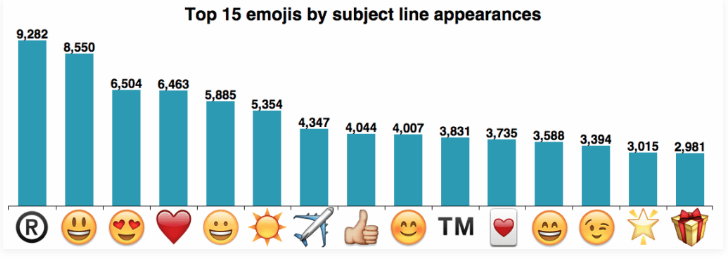
That doesn’t mean they were the most successful.
You’ll have to see which ones work best for you depending on your brand, industry, and purpose of the message.
For example, using the gift emoji or airplane emoji in a subject line would be irrelevant if you’re a restaurant informing your subscribers of your new dinner menu.
Adding emojis to your subject line is a winning strategy because it helps you stand out from the crowd.
Your subscribers get their inboxes flooded with promotional content on a daily basis. Anything you can do to be different will help your cause.
Look at how Grubhub used an emoji in this subject line:

It stands out from the others because it’s the only one with an emoji.
Plus, it’s relevant to the subject line. They used the smiling face with sunglasses for a subject line that’s related to the sun being out.
Add an emoji to your ad headlines
If you’re using sponsored ads to market your business, you should definitely consider adding an emoji to your headlines.
I know it may sound simple, but you’d be surprised at the results you’ll see.
Take a look at this example of a promoted Facebook advertisement from Scoro:
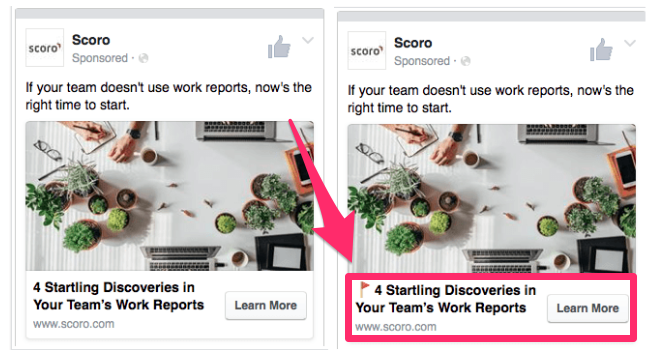
At first glance, the two ads are seemingly identical. But the ad on the right has a simple red flag emoji added to the headline.
Nothing major, right?
Well, Scoro A/B tested these two headlines, and the results were astonishing. The headline with the emoji had 241% more clicks than the one without an emoji.
It’s worth finding out whether your company can have the same success.
Start running A/B tests on your upcoming ad headlines.
Use them in your push notifications
If you have a mobile app for your business, you have an advantage over all of your competitors who don’t.
Having the app is a great start, but you need to make sure you’re getting the most out of the tools at your disposal. You need to learn how to target your mobile customers with push notifications.
These messages get sent directly to the devices of your app users. It’s a great way to contact them with various promotions.
But just like with your email subject lines, the campaigns are useless if nobody clicks on them.
Studies suggest that adding emojis to push notifications can increase open rates by 85%.
The open rates are 135% higher on Android devices than on iOS devices.
That’s an enormous difference.
Here’s an example of how Postmates used this strategy with one of its push notifications:
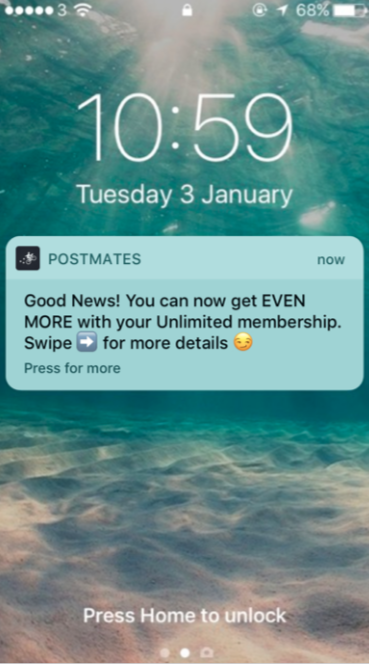
It’s a simple and effective way to promote its membership.
Since push notifications have a limited character count, it’s important to grab the attention of your app users with just a sentence or two at most.
The arrow emoji reflects the swiping motion. And the side smirking face implies there is some type of secret or information worth reading.
Here’s another example, from Yelp:

Again, it’s very simple. It’s using a flame emoji to enhance the phrase “hot new business.”
It’s not rocket science.
You don’t need to create your entire push notification strategy around emojis.
Just write what you were planning to say in the first place. Then add an emoji or two that fit the description, and you’re all set.
Program your chatbots to use emojis
How are you communicating with your customers?
You can provide better customer service by implementing live chat. Now your customers can reach you when it’s convenient for them, without having to make a phone call or send an email.
But it’s not always easy to have a customer service representative available to respond to these messages 24 hours a day, 365 days a year.
That’s where chatbots come into play. You can set up a chatbox to automatically appear in the corner when someone lands on your website.
Take a look at how Air Tailor uses this strategy on its homepage:
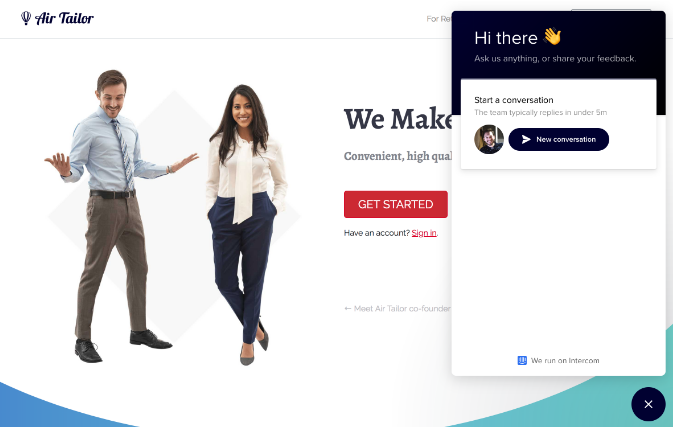
For a business that promotes affordable clothing alterations, effective customer communication is definitely important.
Everyone has unique requests and needs when it comes to getting their clothes tailored. So getting welcomed by a chatbot is a great feature.
According to a recent study from Wise Merchant, adding emojis to the chatbot feature has helped Air Tailor grow by 100% each year.
This strategy worked for them, and it can work for your business as well.
An emoji from a chatbot adds a human element to the conversation, even though the communication is with a robot.
Include emojis in your meta titles
While you may not think of it, people are using emojis in search queries.
Adding an emoji to your meta titles can help improve your SEO strategy. The increase in clicks will drive more traffic to your website.
Here’s an example of what happens when you add the birthday cake emoji to your Google search:

Look at the top two results on the page. They both have a birthday cake emoji in the meta title.
The top two ranked pages of search results control roughly 50% of all clicks.
Adding an emoji to your meta titles and even meta descriptions can increase your chances of getting ranked higher.
Add emojis within the text of your marketing emails
Earlier I discussed how you can use emojis in email subject lines to increase your open rates. But that’s only half of the battle.
Now you need the email recipients to consume the content, click, and convert.
Increasing click-through rates is a top email marketing objective according to a survey of business owners and marketers.
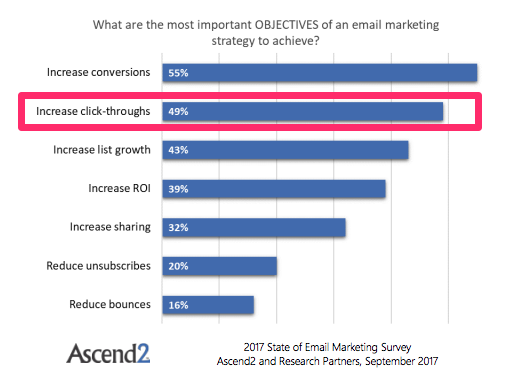
That’s because there is a direct correlation between clicks and conversions.
Getting more clicks can ultimately help your business make more money. Depending on the goal of your campaigns, these clicks can directly drive sales.
A recent study reported that some businesses enjoyed a 93% increase in click-through rates after adding emojis to their email content.
Use emojis in the subject line to generate opens. Then continue using them within the body of the message to increase click-throughs.
Enhance your Instagram captions
You can’t have an effective emoji strategy without changing the way you do things on social media.
Adding an emoji to your Instagram captions is a great way to increase engagement with your followers.
Here’s a look at the top ten most used emojis on Instagram last year:
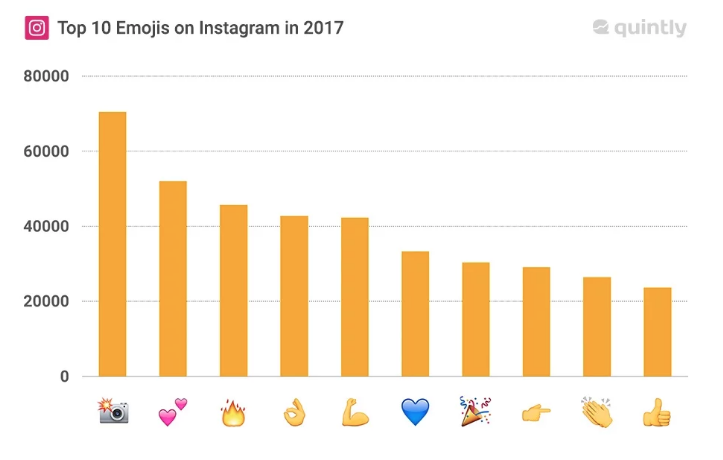
Furthermore, posts with emojis increase interactions by 47.7%, which means users are more engaged with the posts.
It’s no surprise that the camera emoji was at the top of the list. I see this one used all the time.
People commonly use the camera emoji to give credit to another user who took the photo.
If your brand is encouraging user-generated content and sharing photos submitted by your followers, you can use this emoji instead of typing “photo credit.”
Gain an advantage over your competition
If you start using emojis in your marketing strategy, it will help you stand out among your competitors.
While emojis are popular for personal use, businesses are still adapting to this trend. It’s not a strategy that’s being implemented by everyone just yet.
These are the top industries using emojis:

As I said earlier, emojis bring a human element to your marketing strategy.
Consumers don’t feel comfortable interacting with giant corporations. If you take yourself too seriously, you won’t appeal to your customers.
You can use emojis while still remaining professional.
When consumers see emojis in your marketing campaigns, they will feel as though they’re getting a message from one of their friends.
Jump on the emoji bandwagon before your competitors have a chance to catch up with these trends.
Get creative on Twitter
While Twitter may not be your primary marketing channel, you should still have an active account and post content on a regular basis.
Emojis are a great way to drive engagement on your posts and generate clicks. This is especially true if you’re sharing a video.
Pairing an emoji in a tweet containing a video generates six times higher interest and emotional connection among your followers.
Even if you’re not sharing a video, you can still get creative with emojis to improve your tweets. Look at this example from Domino’s Pizza:
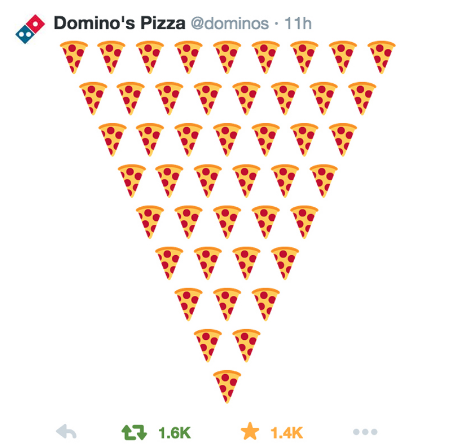
Sure, it may be a bit corny, but it’s definitely creative.
Just look at the engagement on this post. It has more retweets than favorites, which means it’s being exposed to a wide audience.
As a result, the page will be seen by more users, even if they don’t follow the brand.
This increase in exposure will translate to more traffic to the company’s profile and website and ultimately yield more clicks.
Conclusion
It doesn’t look like the emoji trend is going away in the foreseeable future. You need to recognize this and start promoting your content accordingly.
Add emojis to your email subject lines to increase your open rates. Then continue using them within the body of your emails to generate click-throughs.
A/B test emojis in your ad headlines. Use emojis to enhance your push notifications.
Add a human element to your live chat feature by programming your chatbots to use emojis.
Use emojis in your meta titles to improve your SEO ranking. This will help give you an advantage over your competition.
Emojis will increase your engagement metrics on Instagram and Twitter as well.
You don’t need to apply all of these strategies right away. Pick a few and see how they work out for your brand.
Which emojis are you using to increase click-through rates for your marketing campaigns?
from Quick Sprout https://ift.tt/2NrGoFL
via IFTTT
No comments:
Post a Comment